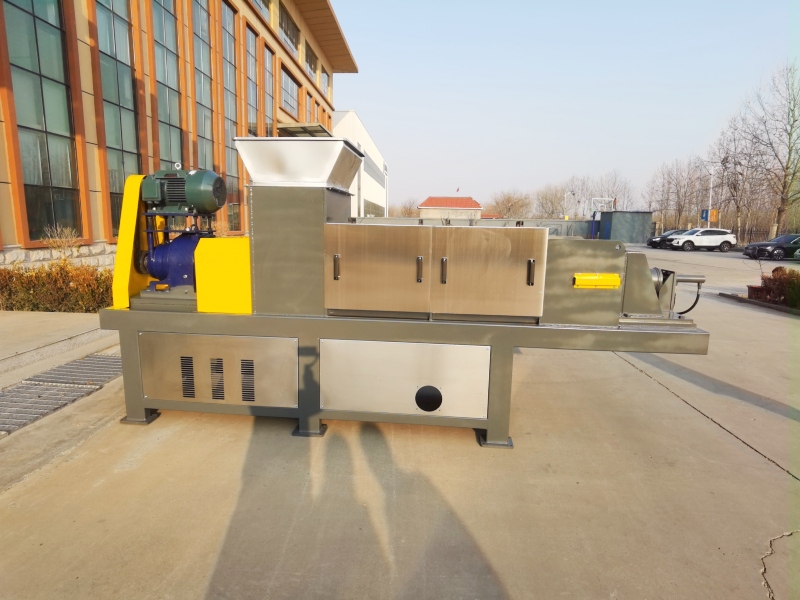
In rural and agricultural production, swill is a common by-product, which usually refers to the sewage produced in the lives of rural residents and the water source brought by farmland drainage. These swills contain a large amount of organic matter, solid waste and nutrients. If not properly treated, they will pollute the environment and waste potential resources. In order to solve this problem, the swill press dehydrator came into being. It is a device that can effectively separate the organic matter and moisture in the swill. It can not only reduce the discharge and pollution of the swill, but also convert the organic matter into useful Resources such as biogas and organic fertilizers. This article will introduce the working principle, advantages and important role of swill press dewatering machine in environmental protection and resource utilization.
1. Working principle of swill press dehydrator
The swill press dehydrator is a device that separates organic matter and moisture in the swill. Its working principle mainly includes the following steps:
Input of liquid swill: First, input the generated swill into the container of the swill press and dehydrator. These swill usually include kitchen sewage, bathroom sewage and farmland drainage.
Mechanical stirring: Once the swill enters the container, the mechanical stirrer will be activated to suspend the solid waste and organic matter in the swill in the water to form a mixture.
Pressing process: Next, the press gradually increases the pressure to force the water out of the mixture and separate it through a screen or filter. This process continues for some time until most of the moisture has been removed.
Collection of solid materials: During the pressing process, the solid materials are compressed into solid blocks that can then be easily removed from the machine. These solid materials usually include organic waste, such as food residues, plant debris, etc.
Output of liquid swill: The remaining liquid swill can be discharged at another outlet after dehydration. This process greatly reduces the moisture in the swill, thereby reducing wastewater discharge.
2. Advantages of swill press and dehydrator
The swill press dehydrator has many advantages in terms of environmental protection and resource utilization. Here are some of the main advantages:
1. Environmental protection: The swill press and dehydrator can effectively reduce the discharge of swill and reduce environmental pollution. By separating organic matter from swill, eutrophication in the water body can be reduced and water quality improved.
2. Resource utilization: Through the swill press dehydrator, organic matter can be effectively separated and collected. These organic materials can be used to produce organic fertilizers, thereby improving soil fertility in farmland. In addition, organic waste can also be used for biogas fermentation to generate renewable energy.
3. Cost saving: The operating cost of the swill press dehydrator is relatively low, and it can convert waste into resources and reduce the cost of waste disposal. At the same time, swill discharge is reduced and additional investment in water treatment facilities may be avoided.
4. Improve farmland benefits: Using a swill press dehydrator to treat farmland drainage can reduce the moisture content in the soil, improve soil permeability, and help increase farmland yields and benefits.
5. Sustainable development: The application of swill press dewatering machine contributes to the sustainable development of rural areas and promotes the sustainable development of rural economy and society through resource recycling and environmental protection.
3. Application fields of swill press and dehydrator
Swill press dehydrators are widely used in different fields, including but not limited to the following aspects:
1. Farmland drainage treatment: Farmland drainage contains a large amount of organic matter and nutrients. Through the treatment of the swill press dehydrator, these useful components can be recovered and the impact of farmland drainage on the environment can be reduced.
2. Rural domestic sewage treatment: The sewage generated in the lives of rural residents can be treated by the swill press and dehydrator to reduce the discharge of sewage and the waste of water resources.
3. Agricultural product processing wastewater treatment: The wastewater generated during the processing of agricultural products usually contains a large amount of organic matter. Through the treatment of the swill press dehydrator, these organic matter can be recovered and used for other purposes.
4. Sludge treatment: Urban sewage treatment plants and industrial wastewater treatment plants usually produce a large amount of sludge. The swill press dehydrator can separate the water from the sludge and reduce treatment and disposal costs.
in conclusion
The swill press and dehydrator is a key tool that can effectively process swill and achieve resource recovery. It has many advantages such as environmental protection, resource utilization, cost saving, etc., and is widely used in fields such as farmland drainage, rural domestic sewage, agricultural product processing wastewater, and sludge treatment. By using swill press and dehydrator, we can not only reduce environmental pollution, but also achieve sustainable utilization of resources and promote sustainable development in rural areas. Therefore, the swill press and dehydrator plays an important role in rural and agricultural production, helping to improve the quality of the ecological environment and rural economic benefits.




If your company wants to establish a business relationship with us, please briefly describe the cooperation intention and send an email to:chuantaiscrewpress@gmail.com























































































![[list:title]](/static/upload/image/20240528/1716877114510915.jpg)